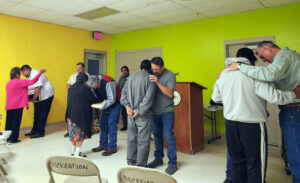
LITTLE ROCK, Ark. (BP)–Ben Mitchell, assistant professor of Christian ethics at Southern Baptist Theological Seminary, Louisville, Ky., sees five theological principles undergirding opposition to physician-assisted suicide.
Mitchell spoke to a group of doctors and nurses June 27 at the Baptist Medical Center, Little Rock, Ark., a day after the U.S. Supreme Court upheld two state laws against physician-assisted suicide.
First, Mitchell said, humans are unlike any other creatures on earth.
“Human beings are uniquely made in the image and likeness of God,” he said, citing Genesis 1:26-27.
Second, God is the giver and sovereign over life.
“And ultimately it is the Lord who gives and takes away life,” Mitchell said.
The third principle, Mitchell said, is that because humans are unique among other creatures, unjust killing must be punished.
Mitchell referred to a “profound passage” in Genesis 9:6 following the flood where “God comes to re-establish covenant with humanity.”
“Whoever sheds man’s blood by man shall his blood be shed,” Mitchell said in reading the verse. In earlier verses, Mitchell recounted, “Noah and his descendants are permitted to kill the animals for food, but if you kill a human being, your blood will be required. Why?
“The text goes on to say, ‘… for in the image of God he made them.’ Therefore, human beings demand a different kind of treatment, a different kind of dignity and respect than other forms of life.”
The fourth principle Mitchell cited is that Christians have the hope of eternal life and resurrection and they “need not be enslaved by a fear of death.”
“I say that realizing there may be things about the dying process that may not be so pleasant and that I don’t look forward to,” Mitchell acknowledged.
Finally, Mitchell said, the Bible nowhere condones suicide. There is one passage that refers to assisted suicide, he said, citing 2 Samuel 1:1-16 where King Saul was wounded in battle. An Amalekite told David that Saul asked him to slay him, ending his pain, which the Amalekite said he did. When David heard the Amalekite’s story, he ordered him to be killed.
“I don’t think the passage is simple enough to use it as a proof text,” Mitchell said, “because Saul occupied a special place as king. But it was a perfect place for David to have said that the Amalekite did the right thing, helping out the king. But he doesn’t.”















